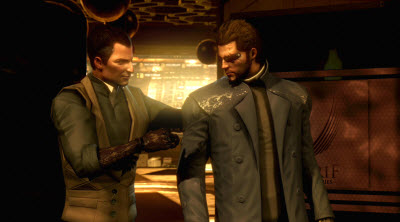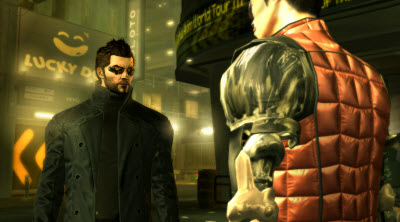 A Rewarding Experience
A Rewarding Experience
Human Revolution’s reward system feels almost Zynga-esque in nature — pulling ideas from the things that made social games like Farmville and Cityville smash hits on Facebook. Those games reward you for doing very small things, but the steady stream of rewards keeps you engaged and constantly hunting for the next reward. The more rewards you pick up, the more powerful you become.
That model was so successful it created an entirely profitable business for Zynga, which recently filed for an initial public offering in order to raise up to $1 billion. Zynga is the most profitable company to file for an IPO this year by a very wide margin.
“You always have to have two ways to win a game,” Kleiner Perkins Caufield & Byers partner Bing Gordon, an investor in Zynga, told VentureBeat in an earlier interview. “If your player hasn’t won within the first 10 minutes of playing the game, you’re doing it wrong.”
The game gives you the biggest bonuses for being clever — like talking your way through a sticky situation. The game rewarded me for stacking boxes through a tunnel where the ground had electricity running across it. I didn’t even notice the switch-box to turn the electricity off, but I still got a reward for finding a unique solution to a problem with several solutions. (Which, as a math geek, is pretty awesome.)
You get rewarded for being a good sharpshooter by picking off enemies with head-shots, which is usually the most efficient way to kill an enemy. You also get a bonus for taking down an enemy without killing them, which you can do by shooting them with a tranquilizer dart or punching them in the face. You get bonuses for taking down multiple enemies at once, like with grenades or punching two guys in the face simultaneously (as you can tell, the face-punching is quite satisfying).
The most fun part of the game is probably the exploration. Deus Ex: Human Revolution’s world is a sprawling cyber-punk dream colored black and gold (see why in this story). There are at least three, if not more, pathways of least resistance to your mission objective. You can crawl through vents, hack open locked doors, jump from building rooftops or walk through the front door with guns blazing to reach your destination. All of them offer some kind of reward — with the more creative pathways giving the most experience points.
The game gives you ways to be a better explorer too, like letting you jump higher or no longer take falling damage when you fall from the top of a building. It turns exploration into this crazy parkour-esque blast, where I found myself literally spending hours digging into every nook and cranny of the massive buildings in Shanghai or Detroit’s sprawling police-filled streets.
The game perfectly fits the description of how to create a rewarding experience. It uses a dual-currency system by giving you experience points for completing objectives and credits, the game’s cash, for killing enemies and selling things. You can use both currencies to improve your character by earning or buying Praxis Points, which let you buy better augmentations and new skills, or by buying new guns and weapon upgrades.
The game litters side-quests along each mission’s path that unlock more details about the near-term dystopia that’s befallen humanity. The missions never feel like a chore because there is always something new to learn about Jensen’s cyberpunk sprawl and the story behind humanity’s new, interesting evolutionary twist.

